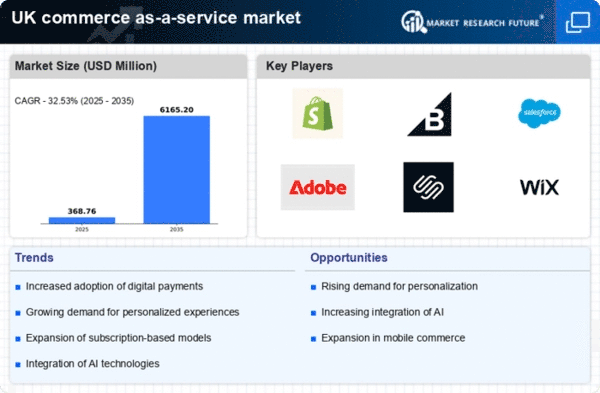Rise of E-commerce Adoption
The surge in e-commerce adoption within the UK has been a pivotal driver for the commerce as-a-service market. As consumers increasingly prefer online shopping, businesses are compelled to enhance their digital presence. In 2025, e-commerce sales in the UK are projected to reach approximately £200 billion, indicating a robust growth trajectory. This shift necessitates the integration of comprehensive commerce solutions that can facilitate seamless transactions, inventory management, and customer engagement. Consequently, the demand for commerce as-a-service solutions is likely to escalate, as businesses seek to leverage these platforms to meet evolving consumer expectations and streamline operations.
Need for Operational Efficiency
Operational efficiency remains a critical driver for the commerce as-a-service market. Businesses in the UK are continuously seeking ways to optimize their processes and reduce operational costs. By adopting commerce as-a-service solutions, companies can automate various functions, such as order processing and customer service, thereby enhancing productivity. Reports suggest that organizations utilizing these services can achieve up to a 30% reduction in operational costs. This efficiency not only improves profit margins but also allows businesses to allocate resources more effectively, further driving the demand for commerce as-a-service solutions in the competitive landscape.
Growing Emphasis on Data Analytics
The growing emphasis on data analytics is reshaping the commerce as-a-service market landscape. Businesses in the UK are increasingly leveraging data to gain insights into consumer behavior, preferences, and trends. This analytical approach enables companies to make informed decisions, optimize marketing strategies, and enhance customer experiences. The commerce as-a-service market is likely to benefit from this trend, as platforms that offer robust analytics capabilities become more sought after. In 2025, it is anticipated that the market for data-driven commerce solutions will expand significantly, reflecting the increasing reliance on data analytics in driving business success.
Shift Towards Omnichannel Strategies
The transition towards omnichannel strategies is significantly influencing the commerce as-a-service market. UK retailers are increasingly recognizing the importance of providing a cohesive shopping experience across multiple channels, including online, mobile, and in-store. This shift necessitates the implementation of integrated commerce solutions that can unify customer interactions and data. As of 2025, it is estimated that over 70% of UK retailers will adopt omnichannel approaches, thereby driving the demand for commerce as-a-service platforms that facilitate seamless integration and data synchronization across various touchpoints.
Regulatory Compliance and Security Concerns
Regulatory compliance and security concerns are paramount drivers for the commerce as-a-service market. With the rise of digital transactions, UK businesses face stringent regulations regarding data protection and consumer rights. Compliance with the General Data Protection Regulation (GDPR) and other legal frameworks necessitates the adoption of secure commerce solutions. As businesses strive to protect customer data and maintain compliance, the demand for commerce as-a-service platforms that offer robust security features is likely to increase. This focus on regulatory adherence not only safeguards businesses but also enhances consumer trust, further propelling the growth of the commerce as-a-service market.

















